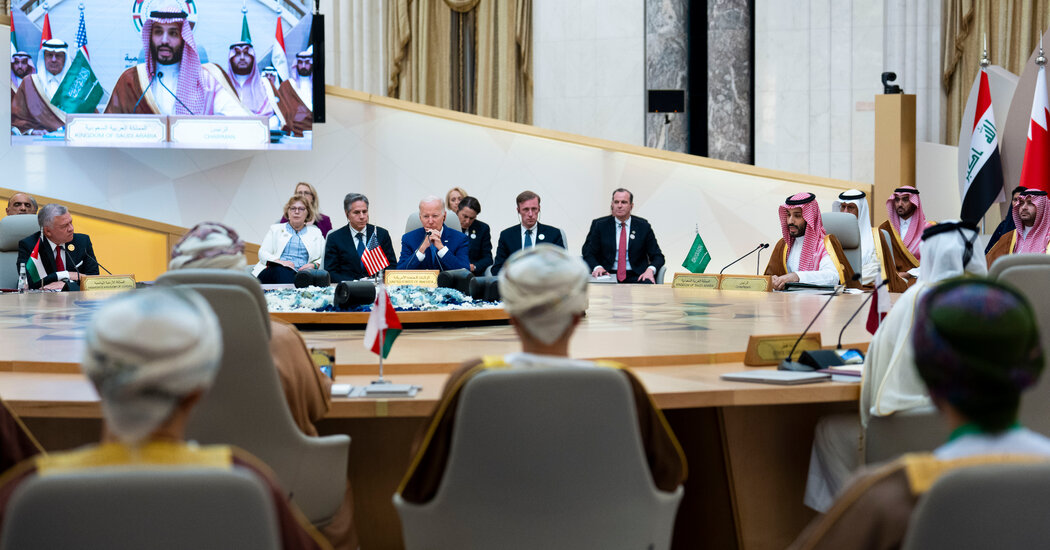Two years into President Biden’s term, his aides began negotiating with Saudi leaders to have the kingdom establish diplomatic relations with Israel. But when the Israel-Hamas war began last October, the talks withered.
American and Saudi officials have tried to revive prospects for a deal by demanding more from Israel — a cease-fire in Gaza and irreversible steps toward the founding of a Palestinian nation. Now those officials say they are close to a final agreement on the main elements of what the Saudis want from the deal: a U.S.-Saudi mutual defense pact and cooperation on a civilian nuclear program in the kingdom.
. . .
But there are no signs that Israeli leaders are moving to join them, despite the symbolic importance for Israel of establishing ties with Saudi Arabia, the most powerful Arab nation.
That resistance, along with a potential full-scale assault by the Israeli military on the Palestinian city of Rafah, puts in jeopardy a potential three-way grand bargain that Mr. Biden envisions as the foundation to a long-term solution to the decades-old Israeli-Palestinian conflict.
This is the best summary I could come up with:
Now those officials say they are close to a final agreement on the main elements of what the Saudis want from the deal: a U.S.-Saudi mutual defense pact and cooperation on a civilian nuclear program in the kingdom.
But there are no signs that Israeli leaders are moving to join them, despite the symbolic importance for Israel of establishing ties with Saudi Arabia, the most powerful Arab nation.
The “bilateral” part was a reference to the talks between the United States and Saudi Arabia on their agreement, which in addition to a defense treaty would involve cooperation on a civilian nuclear program with uranium enrichment in the kingdom, the sale of advanced American-made weapons and, potentially, a trade deal.
Mr. Biden’s willingness to grant a mutual defense treaty and other benefits to Prince Mohammed is a sharp departure from his vow during the 2020 presidential campaign to ensure the country remains a “pariah” because of human rights violations.
Those include the killings of civilians during the Yemen war and the murder in 2018 of Jamal Khashoggi, a Washington Post columnist and Virginia resident, by Saudi agents in Istanbul.
“The basic concept that they’ve been trying to establish is: What would trigger U.S. kinetic action in defense of Saudi Arabia?” said Hussein Ibish, a senior scholar at the Arab Gulf States Institute in Washington.
The original article contains 1,503 words, the summary contains 223 words. Saved 85%. I’m a bot and I’m open source!
Mr. Biden’s willingness to grant a mutual defense treaty and other benefits to Prince Mohammed is a sharp departure from his vow during the 2020 presidential campaign to ensure the country remains a “pariah” because of human rights violations.
We compromise our morals/ethics again and again in the name of obtaining oil.
We really should come up with a different fuel source for our nation, that works as efficiently as oil does, and leave that region to solve its own political problems.
We already have the technology to replace all fossil fuel energy production and almost all types of fossil fuel burning transport.
Only thing we’re missing is for greedy politicians to get out of the pockets of the fossil fuel industries so that the transition can happen in earnest.
From a strategic point of view Fossil fuels are much better for global powers like the US. Renewables are decentralized. Countries cannot be threatened by Embargos or have their economies ruined by energy price surges. Corrupt politicians in the resource exploitation countries cannot be bribed and aided into power to subdue the population on all aspects of the economy any more.
It is the same strategic considerations like in the so called “war on drugs” If you have a strong military having goods in high demand that can only be produced in a few places allows for establishing global control.
We already have the technology to replace all fossil fuel energy production and almost all types of fossil fuel burning transport.
Does your above response include this point …
that works as efficiently as oil does
–
Only thing we’re missing is for greedy politicians to get out of the pockets of the fossil fuel industries so that the transition can happen in earnest.
Not saying that you’re wrong at all, but there’s also the issue of completely replacing our infrastructure to support the new technologies, and the costs involved in doing that.
Not an easy task, though a worthy one.
Does your above response include this point …
that works as efficiently as oil does
More than efficiently enough to cover 100% of the world’s energy needs in perpetuity at a lower cost, yes. Wouldn’t be much of a replacement otherwise.
there’s also the issue of completely replacing our infrastructure to support the new technologies, and the costs involved in doing that.
Never said there wasn’t. All the more reason to start immediately rather than wait for the climate change primarily caused by the burning of fossil fuels and more legislation to protect it from the will of the people to make it even more expensive and time-consuming as it already will be.
One thing’s for sure, though: it’s many times more beneficial than costly for humanity as a whole, as opposed to the toxic status quo that’s killing us in innumerable ways.
Never said there wasn’t.
Never said that you said.
Just pointing out that it’s not just solely the politics that prevents the change from happening (though that’s a part of it).
There’s a lot of inertia to overcome. It’s not just those with interests protecting those interests.




